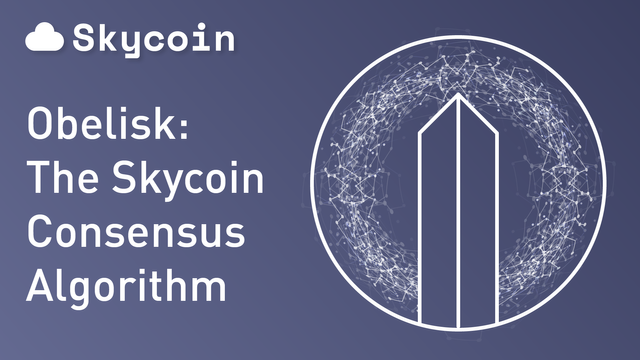Skycoin demystified. Part 4 - Obelisk
If you are a follower of this series in which I have been describing Skycoin one element at a time, it should by now be apparent that this project is fundamentally disruptive to a disruptive industry. Arguably the most disruptive element of Skycoin, the very mechanism which enables the disruption, is Obelisk. Obelisk is Skycoin's consensus algorithm and it's a doozy.

Apart from a few notable exceptions, cryptocurrencies use either Proof of Work (POW) or Proof of Stake (POS) algorithms to gain consensus and secure their networks. POW is the original consensus algorithm described by Satoshi in the Bitcoin whitepaper and it did sterling job of attaining distributed consensus but comes with a tremendous energy consumption overhead due to the enormous amount of processing power required by the miners to solve the computational puzzles.
As the difficulty increases, more processing power is required and more energy is spent. The Bitcoin network now uses an estimated 71 TWh per year with every single transaction having a carbon footprint of almost 500Kg. To anyone with even the vaguest notion of Eco-mindedness, this is not acceptable.
POS was proposed as a consensus mechanism to counter the issues with POW and to do away with the heavy number crunching. The idea is that a node will not misbehave if it has a vested interest in the network's integrity which is not a bad idea but the very nature of POS leads to centralization. Simply put, the haves get exponentially more and consolidate power while the have nots futilely pursue and ever raising bar.
The Skycoin developers solved both the centralization tendencies and energy inefficiency issues displayed by POS and POW with their Obelisk consensus algorithm. Modeled on a 'web of trust' topography, Obelisk distributes influence across the network in a manner reminiscent of human social dynamics. Every node has a list of trusted nodes to which it subscribes and the more subscribers a node has, the more it's influence on the network.
Due to the transparent and public nature of the decisions and trust lists which are located on each node's individual blockchain, a misbehaving node can easily be identified and isolated by the community as nodes will simply remove the malicious node from their trust list, causing the node's influence to wane. This mechanism allows the community to shift the balance of power on the network rapidly which bring s about a highly democratic and decentralized decisioning process.
The original whitepaper describing Obelisk was actually co-authored by Howu Chen, former Ethereum lead developer. Ethereum encounters massive bottlenecks in performance due to a fundamental design flaw which sees all data on the Ethereum network on a single blockchain whereas Skycoin has a dedicated blockchain for every application. What this translates to is consistent lightning fast transactions, excellent scalability and transaction rates of several thousand per second. In fact, Skycoin was designed to be faster than Visa and this has been successfully demonstrated.
Best of all to the end user though, Obelisk transactions are free. Yup. It doesn't cost any Skycoin to send Skycoin and the transaction is lightning fast. Now that is a welcome change in a crypto world riddled with astronomical transaction fees and transaction processing times which run into days.
Upvote this: https://steemit.com/free/@bible.com/4qcr2i